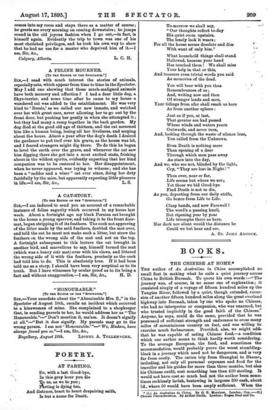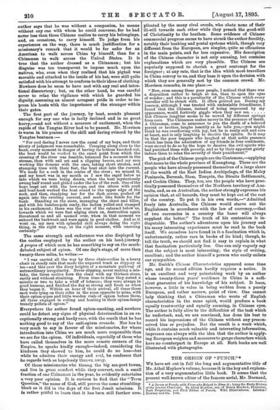BOOKS.
THE CHINESE AT HOME.*
THE author of An Australian in China accomplished no small feat in making what he calls a quiet journey across China to British Burmah. To quote his own words :—" The journey was, of course, in no sense one of exploration ; it consisted simply of a voyage of fifteen hundred miles up the Yangtse River, followed by a quiet, though extended, excur- sion of another fifteen hundred miles along the great overland highway into Burmah, taken by one who spoke no Chinese, who had no interpreter or companion, who was unarmed, but who trusted implicitly in the good faith of the Chinese." Anyone, he says, could do the same, provided that he was possessed of sufficient strength and endurance to cross many miles of mountainous country on foot, and was willing to exercise much forbearance. Provided, also, we might add, that he was capable of eating Chinese food,—a condition which our author seems to think hardly worth considering. To the average European, the food, and sometimes the accommodation, would probably prove the worst stumbling- block in a journey which need not be dangerous, and is very far from costly. The entire trip from Shanghai to Bhame, including, not only all personal expenses and food for the traveller and his guides for more than three months, but also his Chinese outfit, cost something less than £20 sterling. It would not have cost so much had not the author been some- times recklessly lavish, bestowing in largesse 200 cash, about 5d., where 50 would have been amply sufficient. When the • (1.) An Australian in China. By G. B. Morrison. London: COT.—(1) Chinese Characteristics. By Arthur Smith. London: Kogan Paul and Co.
author says that he was without a companion, he means without any one with whom he could converse, for he had never less than three Chinese coolies to carry his belongings, and, on occasions, to carry himself. To judge from his experiences on the way, there is much justification for a missionary's remark that it would be far safer for an American to walk across China by himself, than for a Chinaman to walk across the United States. It is -true that the author dressed as a Chinaman ; but his
disguise was too transparent to impose much upon the natives, who, even when they realised that his pigtail was movable and attached to the inside of his hat, were still quite satisfied with his attempt to conform to their ideas of clothing.
Nowhere does he seem to have met with any real and inten- tional discourtesy ; but, on the other hand, he was careful never to relax the vigilance with which he guarded his dignity, assuming an almost arrogant pride in order to im- press his hosts with the importance of the stranger within their gates.
The first part of the journey, by boat, sounds pleasant enough for any one who is lazily inclined and in no great hurry,—and not without a measure of excitement, when the rapids of the Yangtse River had to be passed. Mr. Morrison is warm in his praises of the skill and daring evinced by the Yangtse boatmen :—
" For cool daring I never saw the equal of my boys, and their nicety of judgment was remarkable. Creeping along close to the bank, every moment in danger of having its bottom knocked out, the boat would be worked to the exact point from which the crossing of the river was feasible, balanced for a moment in the stream, then with sail set and a clipping breeze, and my men -working like demons with the oars, taking short strokes, and stamping time with their feet, the boat shot into the current. We made for a rock in the centre of the river ; we missed it, and my heart was in my mouth as I saw the rapid below us into which we were being drawn, when the boat mysteriously swung half round and glided under the lee of the rock. One of the boys leapt out with the bow-rope, and the others with scull and boat-hook worked the boat round to the upper edge of the rock, and then, steadying her for the dash across, pushed off again into the swirling current, and made like fiends for the bank. Standing on the stern, managing the sheet and tiller, and with his bamboo-pole ready, the laoban yelled and stamped in his excitement ; there was the roar of the cataract below us, towards which we were fast edging stern on, destruction again threatened us and all seemed over, when in that moment we entered the backwash and were again in good shelter. And so it went on, my men with splendid skill always doing the right thing, in the right way, at the right moment, with unerring certainty."
The same strength and endurance was also displayed by
the coolies employed by the author on his land-journey. A propos of which men he has something to say on the much- debated subject of opium. Of one day's stage, of more than twenty-three miles, he writes:— "I was carried all the way by three chair-coolies in a heavy chair in steady rain that made the unpaved track as slippery as ice—and this over the dizzy heights of a mountain pathway of extraordinary irregularity. Never slipping, never making a mis- take, the three coolies bore the chair with my thirteen stone, easily and without straining. From time to time they rested a minute or two to take a whiff of tobacco ; they were always in good humour, and finished the day as strong and fresh as when they began it. Within an hour of their arrival, all these three men were lying on their sides in the room opposite to mine, with their opium-pipes and little wooden vials of opium before them, all three engaged in rolling and heating in their opium-lamps treacly pellets of opium."
Everywhere the author found opium-smoking, and nowhere could he detect any signs of physical deterioration in an ex- ceptionally strong and hardy race, with the result that he has
nothing good to say of the anti-opium crusade. Nor has he very much to say in favour of the missionaries, for whose introduction into China we are much more responsible than we are for the opium. Of individuals, especially of those who have exiled themselves in the more remote corners of the
Empire, he speaks kindly enough—indeed, considering the kindness they showed to him, he could do no less—but while he admires their energy and zeal, he confesses that he regards both as hopelessly thrown away.
Of those missionaries who throng the big sea-port towns, and live in great comfort while they convert, each a small fraction of one Chinaman in the year, he evidently entertains
a very poor opinion. It is curious to find that the " Term Question," the name of God, still proves the same stumbling- block as it did in the days of the first Jesuit missions. It is rather pitiful to learn that it has been still further com-
plicated by the many rival creeds, who abate none of their ill-will towards each other while they preach the good-will of Christianity to the heathen. Some evidence of Chinese commercial progress seems to have struck the author forcibly, notably their banking and postal systems which, though very different from the European, are simpler, quite as efficacious in the main points, and far less expensive. His description of the Chinese character is not only amusing, but contains explanations which are very plausible. The Chinese are popularly supposed to cherish a great contempt for the foreigner ; at any rate, that is the idea which most travellers in China convey to us, and they base it upon the derision with which they are generally met by the common crowd. Mr.
Morrison remarks, in one place :-
"Now, even among these poor people, I noticed that there was a disposition rather to laugh at me, than to open the eyes of wonder; and this is a peculiarity of the Chinese which every traveller will be struck with. It often grieved me. During my journey, although I was treated with undeniable friendliness, I found that the Chinese, instead of being impressed by my
appearance, would furtively giggle when they saw me But Chinese laughter seems to be moved by different springs from ours. The Chinaman makes merry in the presence of death. A Chinaman, come to announce to you the death of a beloved parent or brother, laughs heartily as he tells you,—you might think he was overflowing with joy, but 'he is really sick and sore at heart, and is only laughing to deceive the spirits. So it may be that the poor beggars who laughed at that noble presence which has been the admiration of my friends in four continents, were moved to do so by the hope to deceive the evil spirits who had punished them with poverty, and so by their apparent gaiety induce them to relax the severity of their punishment."
The pick of the Chinese people are the Cantonese,—applying that name to the whole province of Kuangtung. These are the people who have already possessed themselves of a large share
of the wealth of the East Indian Archipelago, of the Malay Peninsula, Barmah, Siam, Tonquin, the Straits Settlements,
and Cochin China. They, too, are the people who have prac- tically possessed themselves of the Northern territory of Aus- tralia, and, as an Australian, the author strongly expresses his opinion that, at all hazards, they must be kept out of the rest of the country. To put it in his own words,—" Admitted
freely into Australia, the Chinese would starve out the Englishman in accordance with the law of currency,—that
of two currencies in a country the baser will always supplant the better." The truth of his contention is in- disputable. The author's adventures upon his journey and his many interesting experiences must be read in the book itself. We ourselves have found in it a fascination which is, unfortunately, rather rare in books of its kind; though, to tell the truth, we should not find it easy to explain in what that fascination particularly lies. One can only vaguely say
that the subject is most interesting ; the style of writing, excellent ; and the author himself a person who easily enlists our sympathies.
Mr. Smith's Chinese Characteristics appeared some time
ago, and its second edition hardly requires a notice. It is an excellent and very painstaking work by an author whose twenty-three years' residence in China is a suffi-
cient guarantee of his knowledge of his subject. It loses, however, a little in value in being written from a purely European, and rather narrow, point of view. One cannot help thinking that a Chinaman who wrote of English characteristics in the same spirit, would produce a book
equally trustworthy and equally amusing, in Chinese eyes. The author is fully alive to the difficulties of the task which he undertook, and, we are convinced, has done his best to
record his impressions of the Chinese without any precon- ceived bias or prejudice. Bat the result is a work which, while it contains much valuable and interesting information,
impresses one always with the idea that the author is apply- ing European weights and measures to gauge characters which have no counterpart in Europe at all. Both books are well illustrated with photographs.



































 Previous page
Previous page